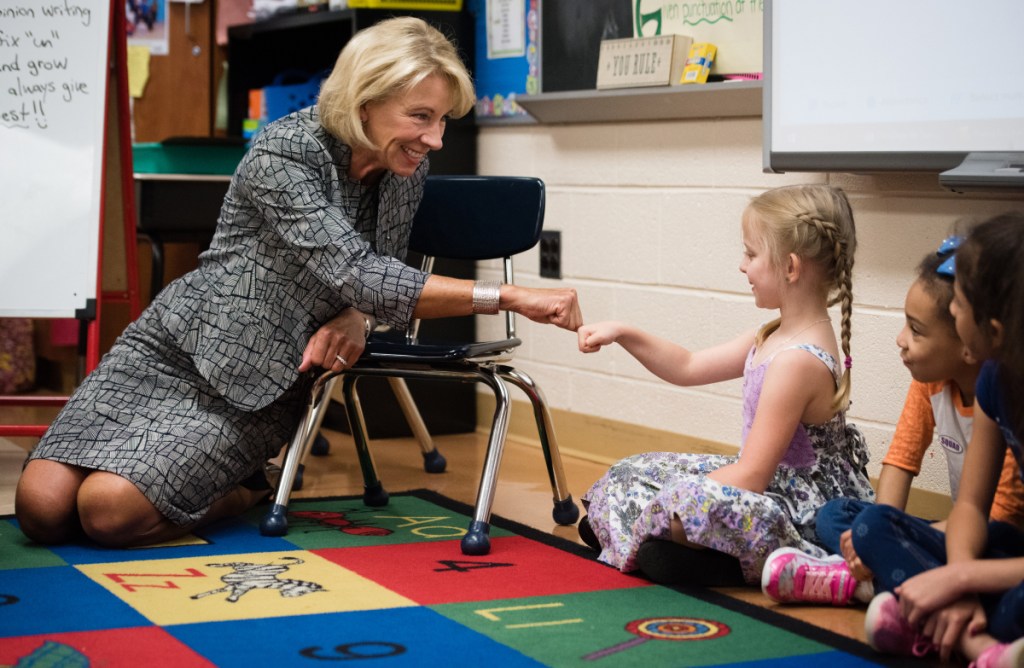HANOVER, Md.— Thursday’s meeting of the Federal Commission on School Safety started on the multicolored carpet of a Maryland classroom. Crouched down on the rug, Education Secretary Betsy DeVos was joined by justice, health and homeland security representatives. And seated around her? About 20 first-graders.
On the agenda at the Frank Hebron-Harman Elementary School in Hanover, Maryland: solving math problems, greeting classmates, discussing how to be good friends, and whether they would rather live in Antarctica or Africa. Students greeted each other – and their grown-up guests – with an “Hola!” and a fist bump. And then teacher Angela Snyder asked them to talk about something nice a classmate had done.
One girl piped up: “When nobody wanted to play with me, she played with me,” the student said, talking about a classmate. “It made me happy inside.”
DeVos and the other adults were at the school for the first of four field trips the safety commission intends to take. President Trump created the panel after the February shooting at a Parkland, Florida, school that left 14 students and three staff members dead.
“In the aftermath, students and educators alike understandably have feared that this could happen in their own school,” DeVos said. “Today, we’re taking a look at a school that has taken a holistic approach to foster a safe and supportive environment.”
They were there to see what works – and how it could be applied at other schools.
The morning meeting that DeVos observed is known among educators as a “restorative circle,” a gathering meant to forge relationships and make students feel they are part of a community. It reflects the school’s broader effort to teach social skills and build trust so that students feel supported, happier and ready to learn. It also could make them safer.
“Students who feel connected to their school community are less likely to harm it,” said Kathy Rockefeller, who oversees implementation of restorative practices in Anne Arundel County Public Schools. She joined DeVos and cabinet officials in the school library in the afternoon to discuss how the school district encourages safety.
Trump has pushed for “hardening” schools with better security and for teachers to be armed, a proposal that teacher unions have roundly rejected. Students at Marjory Stoneman Douglas High – the Florida school where a gunman struck on Valentine’s Day – have organized young people across the country who are calling for tighter gun restrictions.
At Thursday’s field visit, the commission discussed none of those proposed solutions. Instead, it examined a program called Positive Behavior Interventions and Supports, a strategy employed by thousands of schools across the nation that calls on educators to teach good behavior.
One of the core strategies of this approach is teaching interpersonal skills. Just as educators have class time dedicated to math or English, many devote a chunk of the school day to activities intended to ensure children get to know one another and learn how to interact.
“You’ve got to focus on teaching social skills just like you would academics,” said George Sugai, a University of Connecticut professor of special education who studies Positive Behavior Interventions and Supports.
He said schools that have faithfully and consistently implemented the program – which includes interventions for students who misbehave – have seen results. If schools implement the strategy, “you’re likely to see decreases in referrals for major infractions. You’re likely to see decreases in bullying,” Sugai said.
Can such a program prevent school violence? Rockefeller said she believes it might. She notes that students who perpetrate school violence are often described as disconnected and isolated. The positive behavior “and restorative practices are an intentional way to make sure every single student has a connection,” she said.
DeVos and the commission are weighing whether to repeal an Obama-era directive that called on schools to reduce the number of students they suspend and expel, and to use approaches such as Positive Behavior Interventions and Supports to create safe schools.
The teen charged with committing the shooting at the Florida school has a lengthy history of disciplinary problems and mental health issues. Critics of the Obama administration’s directive to reduce suspensions and expulsions have called on DeVos to roll back the guidance, saying it tied the hands of school officials in dealing with dangerous students.
The school safety commission that DeVos leads includes Attorney General Jeff Sessions, Health and Human Services Secretary Alex Azar and Homeland Security Secretary Kirstjen Nielsen. DeVos said in May the commission’s recommendations would be finished by year’s end, but some have criticized the commission for not acting with urgency. Some groups have pointed out that the strategies DeVos was briefed on Thursday are well-known to educators. Schools in Anne Arundel County have been using the positive behavior approach for nearly two decades.
“We’re concerned the secretary is just getting up to speed while the rest of the education community feels the urgency to act to implement practices we already know work,” said JoAnn Bartoletti, executive director of the National Association of Secondary School Principals. “It’s a hazard of a chief education officer who is not in touch with what’s happening in schools.”
Copy the Story LinkSend questions/comments to the editors.



Success. Please wait for the page to reload. If the page does not reload within 5 seconds, please refresh the page.
Enter your email and password to access comments.
Hi, to comment on stories you must . This profile is in addition to your subscription and website login.
Already have a commenting profile? .
Invalid username/password.
Please check your email to confirm and complete your registration.
Only subscribers are eligible to post comments. Please subscribe or login first for digital access. Here’s why.
Use the form below to reset your password. When you've submitted your account email, we will send an email with a reset code.